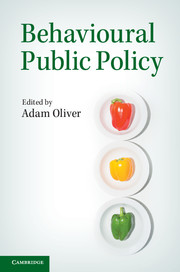Book contents
- Frontmatter
- Contents
- List of Figures
- List of Tables
- List of Contributors
- Introduction
- 1 Ambiguity aversion and the UK government’s response to swine flu
- 2 Models of governance of public services: empirical and behavioural analysis of ‘econs’ and ‘humans’
- 3 From irresponsible knaves to responsible knights for just 5p: behavioural public policy and the environment
- 4 The more who die, the less we care: psychic numbing and genocide
- 5 Healthy habits: some thoughts on the role of public policy in healthful eating and exercise under limited rationality
- 6 Confessing one’s sins but still committing them: transparency and the failure of disclosure
- 7 How should people be rewarded for their work?
- 8 Influencing the financial behaviour of individuals: the mindspace way
- 9 Decision analysis from a neo-Calvinist point of view
- Index
- References
9 - Decision analysis from a neo-Calvinist point of view
Published online by Cambridge University Press: 05 June 2014
- Frontmatter
- Contents
- List of Figures
- List of Tables
- List of Contributors
- Introduction
- 1 Ambiguity aversion and the UK government’s response to swine flu
- 2 Models of governance of public services: empirical and behavioural analysis of ‘econs’ and ‘humans’
- 3 From irresponsible knaves to responsible knights for just 5p: behavioural public policy and the environment
- 4 The more who die, the less we care: psychic numbing and genocide
- 5 Healthy habits: some thoughts on the role of public policy in healthful eating and exercise under limited rationality
- 6 Confessing one’s sins but still committing them: transparency and the failure of disclosure
- 7 How should people be rewarded for their work?
- 8 Influencing the financial behaviour of individuals: the mindspace way
- 9 Decision analysis from a neo-Calvinist point of view
- Index
- References
Summary
By neo-Calvinist point of view, I refer to analysis focused on assessing the diagnostic significance of policy decisions, rather than establishing the direct consequences of decisions. Diagnostic significance refers to information revealed by an irrevocable act, information about some underlying collective value or belief. Decisions, especially those that break with precedent, can expose the tradeoffs between competing values, tradeoffs that society tacitly endorses. In these situations, the role of analysis might be not so much to recommend a course of action, but to clarify what is at stake, the ‘diagnostic risk’ as it were, created by the choice.
Here I outline a simple framework for how this analysis might proceed. The core ideas are taken from an earlier self-signalling model of choice (Bodner and Prelec, 2003; Prelec and Bodner, 2003). That model postulated a distinction between two types of utility: utility that flows directly from the causal consequences of choice, and diagnostic utility, which is the pleasure or pain derived from learning something positive or negative about one’s own internal state, disposition, ability or future prospects. People are presumed to be chronically uncertain about where they stand with respect to these broad attributes, which in turn makes their choices diagnostic. Anticipation of diagnostic reward, or fear of diagnostic pain, promotes self-control and inhibits self-indulgence.
- Type
- Chapter
- Information
- Behavioural Public Policy , pp. 216 - 233Publisher: Cambridge University PressPrint publication year: 2013
References
- 1
- Cited by



